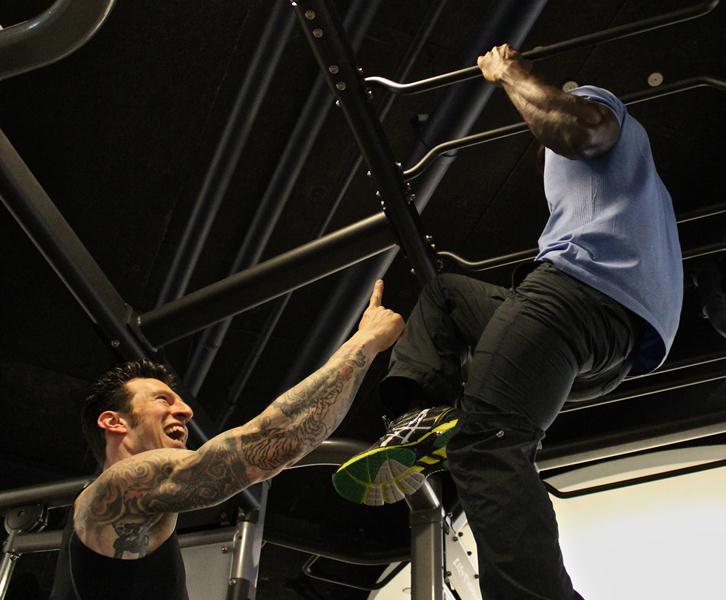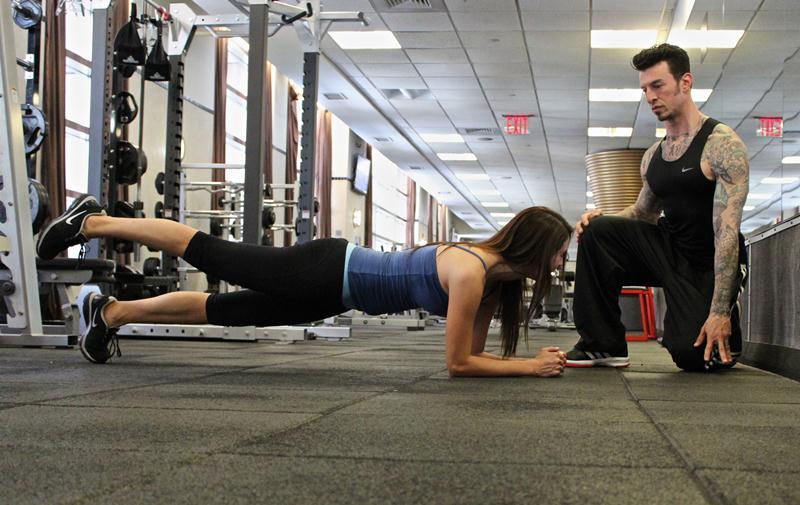Danny Kavadlo: I got started with fitness when I was about 11 years old. My older brother was a big influence. (Al's my younger brother.) We started with all the basics, push-ups, pull-ups, sit-ups—even though I don’t do sit-ups now—and progressed into dips, squats, etc. We really got into it in a noncompetitive way, essentially we just wanted to get stronger and improve ourselves physically. At the time we didn't know any other ways to go about it.
When I got a little bit older, one of my uncles gave us an old rusty weight bench, and that was how I started lifting weights. As a teenager, we started working with the basics of weight lifting. When I started to become more and more interested in training and the idea of becoming a personal trainer, I started to cut down on using equipment as I realized I could get a lot of results just using bodyweight exercises. I started spending time with other people into bodyweight strength training and calisthenics, and began to learn more and more. And, that's how it started.
Dragon Door: How did you decide to become an instructor or trainer?
Danny Kavadlo: I didn't take a direct path towards personal training. Even though I've always been a fitness enthusiast, and had been working out since I was a child, I didn't become a trainer until I was 31. Before then, it hadn't dawned on me that personal training was something I could do to actually help people. Before personal training, I had done many different things. Until I was 25, my main job was playing music, which was great! Then, I worked in marketing and did traveling production work. I did a lot of things which required me to assemble a group of people and make great things happen. After a while, I was burnt out from being on the road for 10 months of the year. I also found myself married and with a kid, so I didn't want to be on the road that much anymore. That's when someone suggested that I'd make a great trainer.
With the experience of working out for 20 years, and working with other people, I had an edge. I got certified, began to learn better methods and more about the body from an academic standpoint. I mainly decided to become a trainer because I needed a change from my previous job and wanted to be a good role model for my son. I also really wanted to help people improve themselves.

Dragon Door: That's great! It sounds like your experience with assembling teams and working with others as a musician really developed some leadership skills too.
Danny Kavadlo: I've always had some leadership qualities. When I was 19, I played in a band with people in their 30s. When we'd tour, I was the one making contracts with the venues and managing the tours. Later when I did traveling production work, I always had a crew that worked for me. After I'd survey a site, I'd hire 20 people in every market. It just came naturally to me.
There’s a certain x-factor people gravitate towards. When you’re instructing anything—a crew of people on a job, or someone perfecting a pull-up—they're coming to you for guidance. So you have to provide it with confidence and authority. Obviously, if you don’t know the answer, don't make it up, but a little confidence on your part is what will get them through.
Dragon Door: Some of my clients who've had the greatest results have been involved with music—I believe it's because they understand the importance of practice. Have you have you seen this pattern with clients, or with yourself?
Danny Kavadlo: I can’t say it better than that. It's one of the analogies that I like to use with anyone starting on a new workout routine or—I hate this phrase—a new workout program, or even a new exercise they've never tried. People with a background in music, learning languages, or learning any kind of skills will quickly understand the importance of practicing the basic fundamentals or rudiments before advancing to the next step.
Many people ask me what's the trick to doing a muscle-up or a human flag, but the truth is there's no trick to it. Before even attempting a muscle-up, you better be able to do 10 sets of 10 pull-ups really well. The trick to getting a muscle-up is trying it 1,000 times and eventually picking up the crucial subtleties. There’s only so much explanation an instructor can do—eventually it comes to a point where someone has to just feel it.
I heard a great quote recently and it’s actually from a ridiculous source—the children’s cartoon, Adventure Time, "Sucking at something is the first step to being sorta good at it." It's true whether you’re learning to play the drums, or if you’re learning to really perfect a push-up.
There’s lots of failure on the road to success and that’s good. If everybody got everything right the first time there would be no challenge. Part of what we're doing is challenging ourselves. We're not just trying to be stronger, and in amazing shape, but I really believe the big goal is self-improvement. When you get strong physically by overcoming obstacles, that helps with everything. A lot of what we do in the gym or at the playground, can be applied to anything. Becoming good at anything requires hard work, discipline, diligence, and of course consistency.
Dragon Door: Absolutely. So what are your some of your current goals?
Danny Kavadlo: My goal is always to challenge myself in new and creative ways. Just when I think I’ve seen everything, I'll find something brand new and really have to try it. Right now I want to get better at my human flag pull-ups. I’ve never been able to do more than three or four nice ones at a time and I’d ultimately like to get that to 10. But, it could take me another 5 years to get there.
Dragon Door: Human flag pull-ups?
Danny Kavadlo: Yes, a horizontal pull-up—a human flag, and then bending at the elbow, to bring the bar closer towards the sternum and then extending the arms back while holding the human-flag position. A set of 10 of them is definitely a long-term goal.
Some short-term fitness goals would be to become more consistent at performing certain moves. And you know—as somebody who trains hard and who’s capable of a lot of amazing feats of strength—sometimes those feats of strength come out pretty easily, then two days later when you try it again it's a lot more elusive. So I’d like to become more consistent within all my skills.
Dragon Door: Many people have a hard time being patient with bodyweight moves, and think that there's a 'trick' that they're missing. What would you say to someone who's frustrated with what they think is slow progress?
Danny Kavadlo: It can be frustrating, and our emotions aren't rational. I tell people all the time it took me years to be able to do a particular move. But, people get frustrated and it’s not always entirely their fault that they feel that way.
I try to encourage my personal training clients and students to live in the present, because there’s no denying we live in a very goal-centric culture. We're constantly bombarded with fake images of 7-minute abs and impossibly quick weight loss transformations—that's just advertising. Anyone who's spent years in the gym, on the mat, or on the playground knows that those claims are fake. But, the average personal training client who's new to fitness just knows they saw something on TV with before and after pictures. Those pictures are often taken on the same day with different lighting, air brushing, and Photoshop, but the average person doesn't know that. They want to believe these amazing results can happen super-duper quick. Something we need to do is dispel the myth, we need to explain that someone doesn’t get out of shape overnight, and they won't get back in shape overnight, either.
We need to focus on being more process-oriented. It's like your music analogy, someone who’s been playing guitar for 6 months will not be able to do the same things as somebody who’s been playing the guitar for 10 years. Unless they’re a prodigy, and that happens in fitness, too. Every now and then, there's someone who can learn to do a move very quickly, but most everyone needs to take the time and respect the moves. Someone working towards their first muscle-up should give it the time it takes. I’ve seen some incredibly fit people—beasts on the pull-up bar—who take months or much longer to get their first muscle-up. If you respect the movement and respect yourself you’ll see that everybody progresses on a different timeline, and all the fake overnight successes just aren't true.

Dragon Door: That’s so important to understand. What's your favorite move right now?
Danny Kavadlo: I’ve been really getting into levers and hand balancing, because to me they're elusive. Some challenges rely on strength and technique, but an elbow lever from a flat surface isn't a strength move. I can work towards a move like that with a 300-pound man who can lift 500 pounds, or with a 105-pound woman who doesn’t really lift weights. Both will start at the same beginning, and that's really exciting for me because I come from a pure strength background. It's like, " Wait a minute, strength actually has very little to do with some of this training, it's more about proprioception, balance, and practice."
Dragon Door: What are you most looking forward to at the Progressive Calisthenics Certification Workshop this summer?
Danny Kavadlo: As someone who’s been in the calisthenics movement for years and have watched grow, it’s just an incredible thing to see the PCC come along. It's something that's time has come. This the first and best ever certification of its kind. Paul Wade wrote an incredible manual for it, which I've gotten to peek into! I can honestly say it's the best, most comprehensive, well written, and informative guide to bodyweight strength training I have ever seen in my life. Bar none.
I know that's a bold statement, but it’s 100 percent true. I’m so excited that this type of training is starting to reach more people, and that more people will learn the progressions. And they won't just learn how to get better at these moves, but they'll learn the subtleties and understand the way the body progresses. Most importantly, they'll learn how to share that knowledge with others—it's all about making the world a better place. The PCC will do all this with just the minimalism of using ones' own body and very little else to train. And that’s a beautiful thing.
Dragon Door: I totally agree, I’m even more excited about it all after hearing you say that!
Danny Kavadlo: There's going to be so much positive energy at this thing. A big room full of fitness enthusiasts, people who want to learn new skills and get stronger, people who want to understand, examine, and experiment with leverage and the body, gravity, and the little subtleties that transform a given exercise. It’s going to be so great.

Contact PCC Master Instructor Danny Kavadlo:
http://www.dannythetrainer.com
http://www.facebook.com/danny.kavadlo
info@dannythetrainer.com
917.414.9013